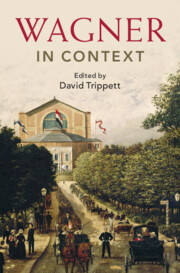Book contents
- Wagner in Context
- Composers in Context
- Wagner in Context
- Copyright page
- Contents
- Illustrations
- Musical Examples
- Contributors
- Acknowledgements
- Abbreviations
- Introduction
- I Place
- II People
- III Politics, Ideas, and Bodies
- Chapter 15 National Politics
- Chapter 16 Revolutionary Politics
- Chapter 17 World-Drama: Wagner’s Hegelian Heritage
- Chapter 18 Towards an ‘Ideal’ Feminine
- Chapter 19 Health and Wellness
- Chapter 20 Sexuality and Social Mores
- Chapter 21 Sentient Bodies
- Chapter 22 Racial Theory
- IV Life, Language, and the Ancient World
- V Music and Performance
- VI Reception
- Further Reading
- Select Bibliography
- Index
Chapter 18 - Towards an ‘Ideal’ Feminine
from III - Politics, Ideas, and Bodies
Published online by Cambridge University Press: 14 March 2024
- Wagner in Context
- Composers in Context
- Wagner in Context
- Copyright page
- Contents
- Illustrations
- Musical Examples
- Contributors
- Acknowledgements
- Abbreviations
- Introduction
- I Place
- II People
- III Politics, Ideas, and Bodies
- Chapter 15 National Politics
- Chapter 16 Revolutionary Politics
- Chapter 17 World-Drama: Wagner’s Hegelian Heritage
- Chapter 18 Towards an ‘Ideal’ Feminine
- Chapter 19 Health and Wellness
- Chapter 20 Sexuality and Social Mores
- Chapter 21 Sentient Bodies
- Chapter 22 Racial Theory
- IV Life, Language, and the Ancient World
- V Music and Performance
- VI Reception
- Further Reading
- Select Bibliography
- Index
Summary
Richard Wagner’s approach to issues of ‘femininity’ and ‘masculinity’ includes the semantics of his musical style as well as his habit of assigning gender-specific traits to certain ideologies, such as nationalism. But the subject of women´s love is the main factor of his oeuvre. Women´s purpose in life lay in loving a man; aberrations turned evil (Ortrud in Lohengrin) or exuded sexual menace (Venus in Tannhäuser). His love affairs were closely related to his work, as the secret abbreviations in his draft of Die Walküre shows. He uses love as a means of redemption and salvation, but his erotic imagination was fascinated by the musical description of desire as in Tristan und Isolde. Women find their identity by finding a man, and they die when they have lost him. His music, however, is an authority able to break through the role of the woman as an appendage of the man.
Keywords
- Type
- Chapter
- Information
- Wagner in Context , pp. 178 - 185Publisher: Cambridge University PressPrint publication year: 2024

